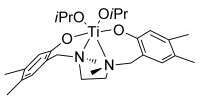
Dual effect of active titanium(IV) centers combined with natural moieties known for their anti-cancer or other complementary activity
Following the cytotoxic activity of cisplatin and its large-scale use in the pharmaceutical industry, there is an increasing interest in finding additional inorganic compounds of different metals with anticancer activity. Titanium was identified as highly promising. Our research group is involved in the synthesis and characterization of Ti(IV) complexes based on diaminobis(phenolato) "salan" ligands (Scheme 1) that demonstrate high cytotoxicity and hydrolytic stability.
Combination chemotherapy is a common methodology used to achieve efficient tumor-growth inhibition while reducing side effects. Combining two or more drugs enables to reduce the dose of each drug to achieve the anti-oncogenic effect and as a result, the toxicity and side effects of each drugs is reduced1.
Many phenolic compounds of natural origin, known for their anticancer and antioxidant activity, are strong bidentate chelating agents with two adjacent anionic O-donor groups suitable to bind the Ti(IV) metal center. In previous research, complexes comprising one bis phenolato tetradentate ligand and an additional chelating ligand demonstrated high hydrolytic stability and cytotoxic activity, both in vitro and in vivo2.
Herein, the combination of salan Ti(IV) complexes with other active polyphenol species is achieved by exchanging the labile ligands in the former, which are not essential for the therapeutic activity of titanium complexes, with a natural catecholato compound known for its anticancer activity, possibly with complementary anti-inflammatory or antioxidant activity. This combination should enable the activity of two active moieties in the cell through hydrolysis.

Scheme 1. Salan Ti(IV) complexes
(1) Ganot N., Redko B., Gellerman G., Tshuva E. Y., Rsc Adv. 2015, 5 (11), 7874–7879.
(2) Tshuva, E. Y. & Miller, M. Coordination complexes of titanium(IV) for anticancer therapy. In Metallo-Drugs: Development and Action of Anticancer Agents, vol. 18, 219–249 (Walter de Gruyter GmbH & Co KG, 2018).
Powered by Eventact EMS